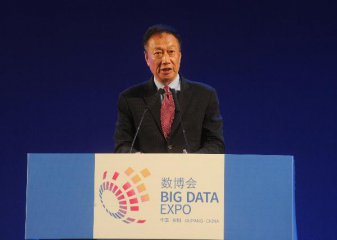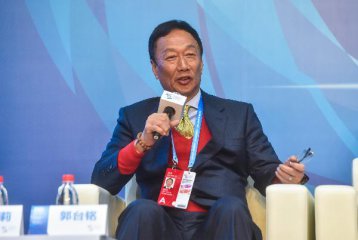
In the company’s first-ever investor meeting and conference call since going public in 1991, senior executives at Taiwan-based Foxconn sought to address investor uncertainty as it prepares for a leadership transition.
Tuesday’s events were aimed at outlining a succession plan for when Terry Gou, Foxconn’s founder, stands down as chairman to focus on his campaign for Taiwan’s presidency. Much of the discussion, however, centered on the worsening trade dispute between China and the U.S. and the impact tariffs might have on the core of Foxconn’s business—assembling iPhones and iPads for Apple, mostly in China.
“We are totally capable of dealing with Apple’s needs to move production lines if they have any,” said Young-Way Liu, the head of Foxconn’s semiconductor business group, said during the meeting at the company’s headquarters outside Taipei.
Mr. Liu said Foxconn’s manufacturing capacity outside of China is sufficient to supply Apple and other customers with products for the U.S. market and that production could be expanded at factories globally “according to the needs of our clients.”
Foxconn has plants in Brazil, Mexico, Japan, Vietnam, Indonesia, the Czech Republic, the U.S. and Australia among other countries, according to the investor presentation.
Formally known as Hon Hai Precision Industry Co. 2317 1.80% , Foxconn is the world’s biggest contract electronics manufacturer and relies on Apple and China for a large portion of its business. Around 50% of Foxconn’s revenue is related to Apple, analysts say. Meanwhile, only about 25% of its manufacturing lies outside China, according to Mr. Liu.
Foxconn and other manufacturers have been laying plans to shift some production out of China as the trade tensions continue to escalate with no resolution in sight, according to many analysts.
The company has already seen clients, including Apple and Huawei Technologies Co., move production to other locations, Mr. Liu said. Planning for such a shift has gathered steam since the U.S. last month increased import tariffs on $200 billion of Chinese goods to 25% from 10%, and proposed to tax another $300 billion of China exports, including smartphones, according to industry executives.
The new tariffs “killed a lot of people’s hope both China and the U.S. will reach an accord,” one of the executives said. “Now everyone realizes this is a long-term change.”
As many companies plan production shifts, Chinese officials told some foreign technology companies last week that there would be unspecified consequences if they pulled out of China, The Wall Street Journal has reported.
Foxconn recently said it set up a team to deal with fallout from trade tensions and that it is monitoring the situation around the clock.
Source: The Wall Street Journal





















Latest comments